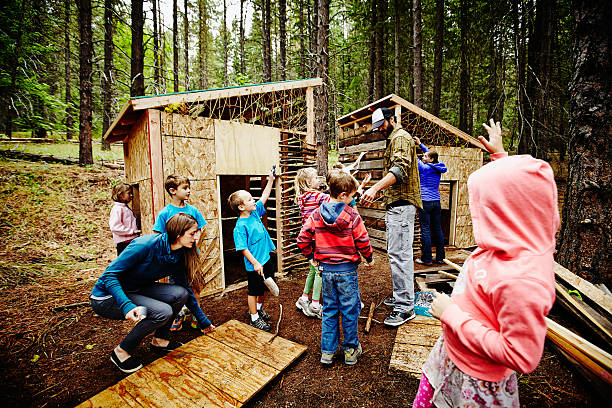All children look forward to summer holidays. After all, they will be able to rest from school for three whole months. And sunny warm days greatly expand the opportunities for entertainment and recreation. Most kids love spending time at camp. There they find many new friends, they are entertained around the clock by specially trained people, doctors, psychologists, animators, and teachers work with children. But there are no parents. And this is what attracts children the most. It’s the only thing that scares parents the most. This is what we will talk about today.
Should I send my child to camp?
It is impossible to say unequivocally whether it is worth sending the child to the camp or not. This is up to the parents to decide. But we can analyze the pros and cons of staying in the camp from a professional point of view.
pros
Benefits of a summer camp for a child:
- productive rest;
- constant supervision;
- fight against bad habits;
- daily routine, mode;
- limited circle of communication;
- new acquaintances and friends;
- creative self-realization;
- harmonious comprehensive development;
- the opportunity to be yourself (the child does not need to follow any image, you can relax and even try yourself in a new role).
Camp staff are required to ensure the safety of children. An outsider cannot enter the camp, children cannot freely leave the camp. But this is not all the benefits. From a psychological point of view, the camp is useful for educating the independence and responsibility of the child, for his self-realization and self-development.
In most camps, the children themselves wash and iron things, and pick up their own clothes. And also most of the camps are engaged in the labor education of children: help set the tables, tidy up the room, and so on. If your child is not distinguished by household independence, then the camp can help fix this.
But the main psychological advantage of staying in the camp is the development of communication skills. The child meets different people. Children from different families meet in the camps. There will inevitably be conflicts in relationships . But it is in the camp that a child can learn to solve them, understand and accept the characteristics of other people. And educators and counselors will help with this.
Minuses
Some psychologists believe that camping is not suitable for shy, unsociable children. But it seems to me that the camp, on the contrary, can become a powerful means of socialization . The question is what temperament your child has and how the camp teachers do their work. If your son (daughter) is prone to introversion , solitude, then he will feel uncomfortable in the camp. But if your child is simply shy, intimidated, or shy, camp and counselors can help break down speech and social barriers.
What kind of children find it difficult in the camp:
- those who did not attend kindergarten and were an outcast at school;
- those who are called the “white crow”;
- those who are accustomed to guardianship and even hyper-custody from their parents;
- those who do not know how to follow the routine;
- those who are prone to deviant behavior ;
- those who do not know how to talk about their desires and needs;
- those who cannot stand up for themselves;
- those who are insecure and anxious.
Difficult does not mean impossible. Most children with these characteristics will benefit from the camp. But if the case is very difficult, and the quality of services in the camp leaves much to be desired, then the child may be traumatized.
Instruction for parents
It also happens that the child does not want to go to the camp, and the parents diligently send him there. It is not right. If the child does not want to, then it is not necessary. If the child wants, but parents doubt, then here are a few recommendations for moms and dads:
- When choosing a camp, you need to listen to the opinion of the child and choose a camp that matches his interests. Better yet, offer several options – let the child choose.
- Before buying a ticket, study the work of the institution. Read reviews, check the daily routine, etc. Unfortunately, not all camps provide quality services, not all institutions can ensure the safety of children.
- Carefully read the requirements of the camp for the health of children. Against the backdrop of climate change, nutrition and psychological conditions, chronic diseases can worsen.
- Before buying a ticket, discuss with your child the features of staying in the camp. Not all children know that they need to live according to the schedule, observe discipline, sleep and stay awake according to the schedule, do exercises, etc. And also, not everyone knows that it is impossible to leave the territory of the camp. And the child must also understand that parents are financially and even criminally responsible for his behavior. And if the child has reached the age of 14-16, then he himself is responsible.
- If a child of 6-7 years old is going to the camp, then it would be nice to send him with an older brother (sister) or friend. Then adaptation in a new team and new conditions will be easier. The same is true for sending shy and anxious children.
- Call up the child, be attentive to his words. Be prepared to come visit or to take him home. But do not call every half an hour and do not come spontaneously. Discuss the conditions and mode of communication in advance.
- Do not rush to pick up the baby in the first week. That is how many days it takes to adapt, find friends and hobbies, determine a place in the detachment. At this time, the child may often call and ask to go home.
- Give your child pocket money. They may be needed for additional excursions, souvenirs, shopping trips.
- Do not pass on your fears, doubts, anxieties to your child. Talk only about the positive aspects of the holiday, cheer.
- Support the child and prepare to enter the team. You can teach him a couple of interesting phrases for dating or offer to treat all the guys with candy, etc. The choice of means for communication and dating depends on age.
- Offer the child a couple of strategies for resolving conflicts, discuss possible difficulties. Explain how you can stand up for your opinion in a socially acceptable way. Say that you believe in the child, always ready to support and come to the rescue.
- Tell us that competitions are held in the camps, for participation in which you can receive certificates, commendable letters and valuable prizes. Encourage the activity and independence of the offspring.
- If the child wants to go to camp, but is both anxious and worried, then cheer him up. Tell us about your camping experience or take a look at the institution’s website together. As a rule, on the site you can find photos and videos, a detailed description of the cultural and educational program, leisure activities, and more.
- Explain that for any question, the child can turn to counselors, teachers or other adults.
How to understand that the camp has benefited the child? Your child has returned with new knowledge and skills (useful, not destructive and asocial), friends, hobbies. You cannot help but notice how the child will be transformed if the rest is beneficial.
What not to do
Under no circumstances should a decision be made for the child. It happens that parents want to tear their son or daughter away from the computer, bad company or other negative factors in their understanding. At the same time, parents do not delve into the details of the organization of camp life, and do not take into account the interests and inclinations of the child. They just send it anywhere. And it is unlikely that, by a lucky chance, this will coincide with the preferences of the child himself. And the realization that his opinion means nothing will not do any good. The child will either tearfully ask to go home, or will act in spite of his parents and, returning from the camp, will become even more mired in a computer or bad company.










